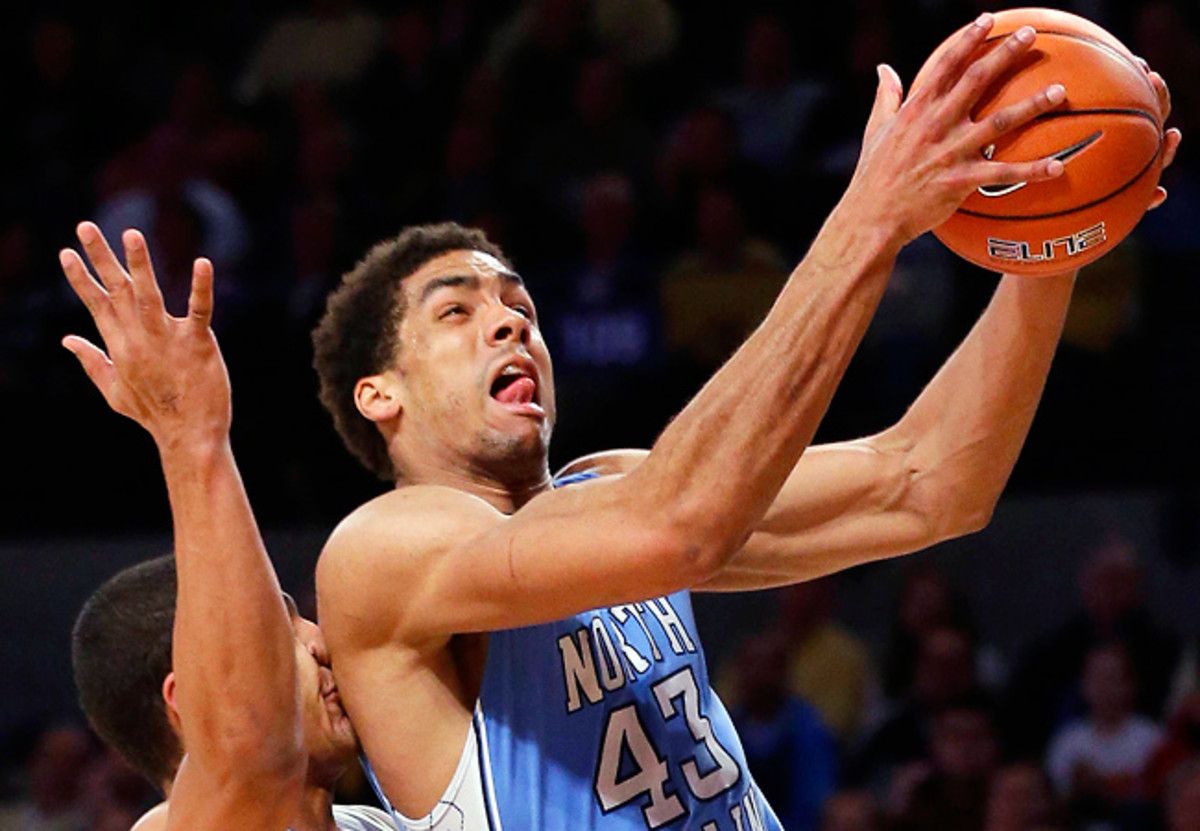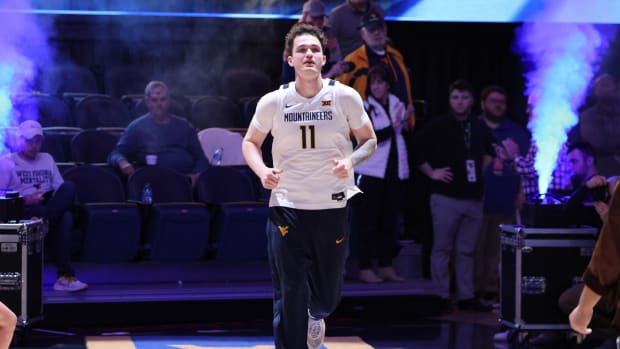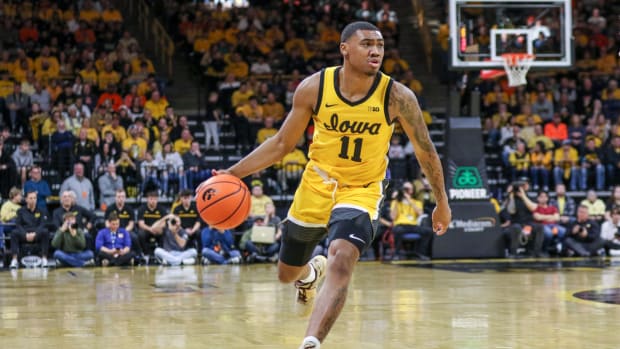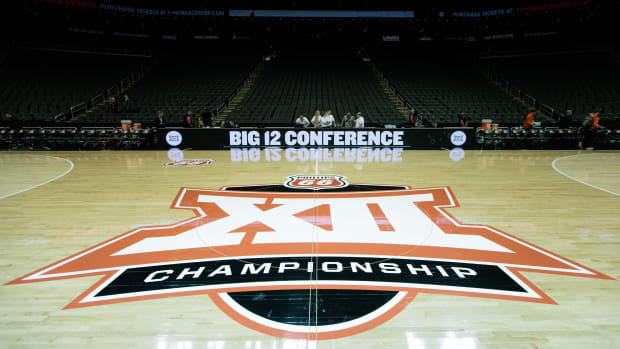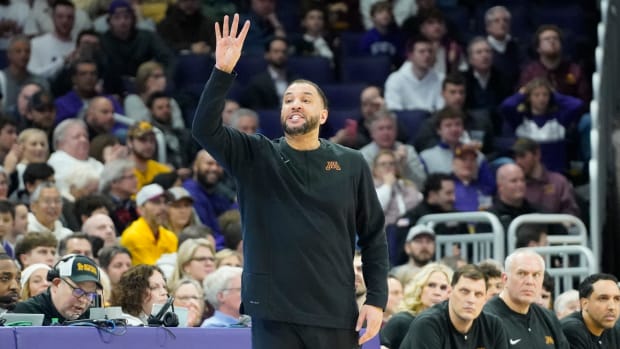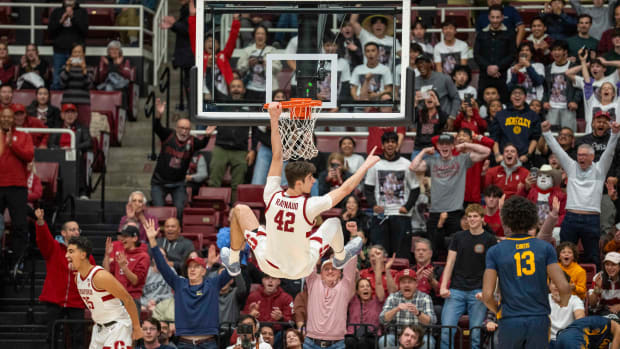Smaller lineup paying big dividends for reinvented, reinvigorated Heels

Sophomore James Michael McAdoo leads the Heels in scoring (14.5 per game) and rebounding (8.1)
John Bazemore/AP
The day everything changed, very little actually changed for North Carolina.
As usual, the practice plan was posted for all to see. Four names in the primary group were the same; ascending into that quintet was P.J. Hairston. By the book, Hairston was a 6-foot-5 guard, and now it appeared a few strokes of a pen transformed him into a 6-5 power forward.
James Michael McAdoo was neither staggered nor alarmed. He was now, nominally anyway, a 6-9 center. His coach rearranged duties and gave him a job, posting. Much of this Tar Heels season was supposed to revolve around McAdoo, but now everything actually revolved around the talented sophomore. Still, he reacted with more shrugs than questions. It's temporary, McAdoo thought.
"Honestly, I just rolled with it," McAdoo said. "I wasn't surprised at all. I don't even honestly remember what it was like when I looked at the practice plan. I just went out there and played."
It's a centered attitude, all right, but the results have permitted the Tar Heels and their previously nerve-wracked faithful to keep calm and carry on. Four straight victories have propelled North Carolina to double-digit ACC wins and 20 overall and, barring a massive collapse, a place in the NCAA tournament. The Tar Heels now have solid postseason footing. And much of it has to do with a reinvention that aimed less at small ball than squall ball.
North Carolina coach Roy Williams felt his squad needed to score more, or at least with more reliability than it was scoring when 6-11 Desmond Hubert -- who had contributed less than one basket per game on average -- was in the starting lineup. Since the change, scoring in ACC games is up merely a titch (71.4 in 10 games before, 75 in the five after). Self-assurance is up by a good deal more than that.
"Here's the thing -- I think a little too much is being made out of the four-guard deal with North Carolina," said N.C. State coach Mark Gottfried, whose team beat the Tar Heels on Jan. 26 and then lost to the reinvented lot on Feb. 23. "He put his best five scorers on the floor regardless of how tall they are. [Reggie] Bullock and Hairston are both good sized wing players. In college basketball today, that's not uncommon at all to see that.
"So they're a more confident team. With Hairston on the floor, they've got somebody who has the potential to get 20 [points] on a given night. [Wiliams] is just playing his best players and doing a good job with it. When they have five guys on the floor who can score as opposed to playing with four --which they've done this year -- they're obviously a lot better."
It's a little more involved than merely inserting another scorer and reaping benefits. North Carolina's spacing is better, or at least better for its guards, as opponents must honor four three-point threats at a time and leave more accommodating driving lanes. And the vaunted secondary break required a tweak here and there; normally it finished with a big man screening for another big man down low, whereas now Hairston has the option to set that screen or fan out to be another shooter on the perimeter.
But, yeah, mostly it's about getting points. "We have more options on the court that can be a threat from the beginning of the game, which is big for us," North Carolina guard Marcus Paige said. "We're not as talented as some of the past Carolina teams, who could just score at will."
Said McAdoo: "Overall, it just allows us to get back to what Carolina basketball is about. And that's getting out and running."
Being held hostage to your own history is inevitable for a program such as this, which precipitates enough hand-wringing to blister knuckles when things happen like 24-point losses to Indiana or 18-point losses to wayward Texas or two straight defeats to begin ACC play in which the Tar Heels didn't crack the 60-point barrier.
So the questions dogged Paige in classrooms, in the library, at the food court. Concerned fans were wondering exactly where their basketball team would find itself in the postseason when it arguably hadn't found itself, period.
"It was a little challenging," Paige said. "You never expect to get blown out the way we did in a couple of games. You just hear stuff around campus, like people worrying about whether we'll even make the tournament, and that gets to you. You don't want to be a Carolina team that's not even in the NCAA tournament."
No one player embodied outsize expectation like McAdoo, who averaged a fraction more than 15 minutes per night as a freshman but was so blatantly freakish that he became the rare player to produce just six points per game but then also produce a statement saying he would not leave school for the NBA draft.
The raw numbers this year indicate a more than respectable jump (14.5 points, 8.1 boards per outing) while less conspicuous measurements like true shooting percentage or offensive rating were flat or down from one year to the next. Still, it wasn't until health issues dogged him in early February that McAdoo went consecutive games without scoring in double-digits. And still, if it wasn't a sophomore slump, some detected at least a slouch.
"I try not to look at it as pressure," McAdoo said. "I do everything I can each and every day, put the work in, to get the results that I want. At the end of the day I can live with what I accomplish. Nothing comes easy. Last year I learned that when I got here. I didn't work to the capability I should have, and I kind of kick myself for that."
Indeed, there was also what McAdoo describes as a bit of personal reinvention, pre-lineup modification: Backing up high-profile veterans in his first season relieved pressure but apparently also relieved him of his work ethic. "The biggest thing was getting back to what made me the basketball player I was when I first got here -- having fun and enjoying the game, and working hard in everything I do," McAdoo said. "That's something I definitely did in high school and kind of got away from when I first got here, thinking everything would come naturally. It was something that I could do easily, playing with great players like Jon Henson and Tyler Zeller, where I wasn't necessarily always needed. But once I realized I could be a key, integral part of that team last year, and knew I was going to have to step my game up and really be a leader (this year), it was taking each day for what it is and try to work as hard as I can to get better."
And North Carolina's alleged small-ball plan may be working only because McAdoo plays big, in every sense. Battling Zeller in practices last year while giving up four inches and about 30 pounds taught McAdoo how to do his work early against bigger centers -- toiling to deny the ball to prevent scoring chances, or swiftly working to find his man when shots went up to prevent offensive boards.
Meanwhile, having a springy, active 6-9 player slotted at center who is eminently comfortable on the perimeter actually may create good kinds of problems. "Because he finds ways on the glass and post ups, or he'll beat you quick because he has a 'five' guarding him, it just kind of plays into everything with the four wing players around him," Virginia coach Tony Bennett said. "I think it's almost an advantage in a way."
"If we would have a traditional big man," Paige said of the new-look lineup, "I don't know if it would work as well as it has with 'Mac,' who is able to do a little bit of everything."
Four straight wins before a Sunday matinee against Florida State has erased panic, if not all doubt. This team isn't, as Paige said, like some Carolina teams of the past. But as McAdoo recalled a conversation with his father last week during which he was reminded to absorb the atmosphere during pregame introductions and remember how lucky he was, the pressure seemed lifted. He was doing what he could. North Carolina was as well, no longer trying to be something it isn't, not for five games at any rate.
This version of the Tar Heels now is running, too, if only to catch up. "At the end of the day," McAdoo said, "we need to win some ballgames."
